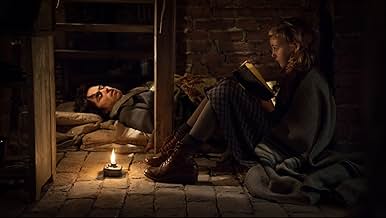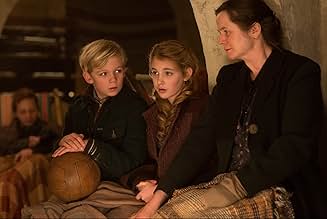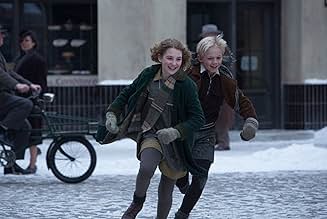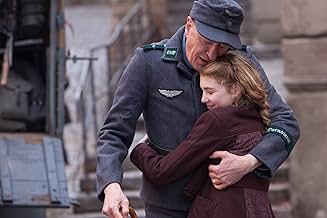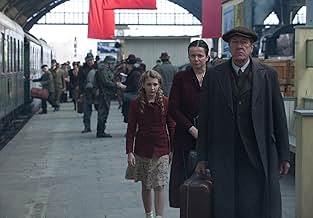IMDb-BEWERTUNG
7,5/10
145.809
IHRE BEWERTUNG
In den Schreckensjahren des Zweiten Weltkriegs in Deutschland findet die junge Liesel Trost darin, Bücher zu stehlen und diese mit anderen zu teilen. Ihre Adoptiveltern verstecken im Keller ... Alles lesenIn den Schreckensjahren des Zweiten Weltkriegs in Deutschland findet die junge Liesel Trost darin, Bücher zu stehlen und diese mit anderen zu teilen. Ihre Adoptiveltern verstecken im Keller ihres Hauses einen untergetauchten Juden.In den Schreckensjahren des Zweiten Weltkriegs in Deutschland findet die junge Liesel Trost darin, Bücher zu stehlen und diese mit anderen zu teilen. Ihre Adoptiveltern verstecken im Keller ihres Hauses einen untergetauchten Juden.
- Regie
- Drehbuch
- Hauptbesetzung
- Für 1 Oscar nominiert
- 9 Gewinne & 17 Nominierungen insgesamt
Roger Allam
- Narrator
- (Synchronisation)
- …
Empfohlene Bewertungen
I do not know the book. But the film, for its beautiful simplicity is useful in high measure. A film about war and survive, well acted, touching and delicate, great for small details and for the atmosphere, reminding the art of admirable actors, proposing a magnificent trip inside yourself. Short, just delightful , with bitter taste and wise definition of the life meanings.
This is a flat out amazing film. It's nuanced, extremely thoughtful and features some of the strongest performances of the year. If I had a vote, we'd get another young teenage girl nominated for "best actress" in a lead role for Sophie Nelisse's amazing work. Everyone's work here is award worthy. Sure, the subject matter may seem like a rehash (The Diary of Anne Frank"/"The Boy in the Striped Pajamas"/The Pianist") but it really isn't. It's fresh, and packs the most emotional impact of any film that I've seen all year. Captivating and extremely powerful, the film is hauntingly beautiful. It moves at an effortless pace which allows the viewer to become immersed in the realities of Liesel's situation. That pace may not be for everyone but I found it to be perfect. Everything breaths properly and every connection made is heartfelt and meaningful. The literary vehicle of death as the narrator really is a masterstroke and works perfectly. It starts the film and finishes but is never intrusive.
I honestly feel this film is an instant classic. It really stayed with me after watching it and I'm still moved by its impact.
I honestly feel this film is an instant classic. It really stayed with me after watching it and I'm still moved by its impact.
10mkelly54
No extended fight scenes. No unnecessary pyrotechnics. Simply a story of ordinary people conducting themselves in extraordinary fashion when faced with the hell of Hitler's Third Reich and World War II.
The literary vehicle of Death as the Narrator is a masterstroke, as is the overall emphasis of words/books/art overcoming evil.
And it's all done with compassion for children at their best and most vulnerable, and adults bypassing the convention of the era to display kindness, caring and understanding.
An understated classic, there aren't enough movies like this being produced.
And that's a damn shame.
The literary vehicle of Death as the Narrator is a masterstroke, as is the overall emphasis of words/books/art overcoming evil.
And it's all done with compassion for children at their best and most vulnerable, and adults bypassing the convention of the era to display kindness, caring and understanding.
An understated classic, there aren't enough movies like this being produced.
And that's a damn shame.
Those familiar with the 2005 award winning and best-selling novel by Australian author Markus Zusak will not be disappointed with the theatrical version which differs from the book in only minor details. Both tell the story of a preadolescent girl who is adopted into a German family living in a small village in 1938, and then by following her life we get to view war on the home front for Germany. Nazi rallies, anti-Jewish pogroms, Hitler Youth groups, conscription, book burning, daylight bombing, propaganda films and posters, and the whole gamut of events are seen from her perspective.
This isn't the first film to adopt this perspective. "The Diary of Anne Frank" is the classic example, but more recently, "No Place on Earth" (2013) covered some of the same ground as did "The Boy in the Striped Pajamas" (2008) and especially "Lore" (2012).
"The Book Thief" has wonderful photography by Florian Ballhaus, an excellent musical score by Golden Globe and Oscar winning John Williams ("Schindler's List", "ET", "Star Wars"), and best of all, marvelous acting from Sophie Nelisse as the young girl, Geoffrey Rush and Emily Watson as her adoptive parents, and Ben Schnetzer as the Jewish boy they hide. Many of the core scenes with Nelisse, Watson, and Rush should be required viewing at any acting school.
Hats off too to young Nico Liersch who plays a boyhood friend of Nelisse.
If the film has any fault at all, it is the decision by the film makers to try to walk a fine line between drama and fable. Having "Death" as the narrator right from the start seems to suggest fable, but the story itself veers sharply to drama for most of the 2+ hours, and then, noticeably at the end, reverts to fable. Some viewers may find this disconcerting. But the power of the story and the acting generally compensate for this short coming.
This isn't the first film to adopt this perspective. "The Diary of Anne Frank" is the classic example, but more recently, "No Place on Earth" (2013) covered some of the same ground as did "The Boy in the Striped Pajamas" (2008) and especially "Lore" (2012).
"The Book Thief" has wonderful photography by Florian Ballhaus, an excellent musical score by Golden Globe and Oscar winning John Williams ("Schindler's List", "ET", "Star Wars"), and best of all, marvelous acting from Sophie Nelisse as the young girl, Geoffrey Rush and Emily Watson as her adoptive parents, and Ben Schnetzer as the Jewish boy they hide. Many of the core scenes with Nelisse, Watson, and Rush should be required viewing at any acting school.
Hats off too to young Nico Liersch who plays a boyhood friend of Nelisse.
If the film has any fault at all, it is the decision by the film makers to try to walk a fine line between drama and fable. Having "Death" as the narrator right from the start seems to suggest fable, but the story itself veers sharply to drama for most of the 2+ hours, and then, noticeably at the end, reverts to fable. Some viewers may find this disconcerting. But the power of the story and the acting generally compensate for this short coming.
If this film is not on most Top 10 Lists then what I think about critics will hold. As the saying goes " I laughed, I cried, i felt good. This film shows hope in the face of the worst that life serves up, and wants you to come back for more. The acting from top to bottom was fantastic. Geoffrey Rush gives a wonderful performance that should get him an Oscar nomination. This is by no means a feel good movie, and I wouldn't bring younger kids to see it, but it will make them think about. Best of all look for the answer to the many questions this film should leave in their minds. Questions of did this happen, and if it did, WHY? I like that as in other films about this time, it focused on the ordinary people of Germany not just the victims of the Holocaust. How their lives were touched by the insanity of the masses and how some never lost sight of what it was to care about others.
Wusstest du schon
- WissenswertesOne of the books that Liesel read to Max when he was sick is actually the novel "The Book Thief", namely the sentence: "what came to her then was the dustiness of the floor, the feeling that her clothes were more next to her than on her, and the sudden realization that this would all be for nothing".
- PatzerWhile in the basement, Hans comments that the snowman will not melt because "it's freezing down here," yet no character's breath can be seen in the air, despite the fact that all are breathing heavily. The visibility of breath in the cold is determined by not only the temperature, but also the relative humidity, so it is possible for it to be cold without the characters' breath showing.
- Zitate
[from trailer]
Max Vandenburg: If your eyes could speak, what would they say?
- VerbindungenFeatured in Today: Folge vom 23. August 2013 (2013)
- SoundtracksWiegenlied (Lullaby) Op. 49 No. 4
Written by Johannes Brahms
Top-Auswahl
Melde dich zum Bewerten an und greife auf die Watchlist für personalisierte Empfehlungen zu.
Details
- Erscheinungsdatum
- Herkunftsländer
- Offizielle Standorte
- Sprachen
- Auch bekannt als
- Ladrona de libros
- Drehorte
- Produktionsfirmen
- Weitere beteiligte Unternehmen bei IMDbPro anzeigen
Box Office
- Budget
- 19.000.000 $ (geschätzt)
- Bruttoertrag in den USA und Kanada
- 21.488.481 $
- Eröffnungswochenende in den USA und in Kanada
- 105.005 $
- 10. Nov. 2013
- Weltweiter Bruttoertrag
- 76.586.316 $
- Laufzeit
- 2 Std. 11 Min.(131 min)
- Farbe
- Sound-Mix
- Seitenverhältnis
- 2.35 : 1
Zu dieser Seite beitragen
Bearbeitung vorschlagen oder fehlenden Inhalt hinzufügen







